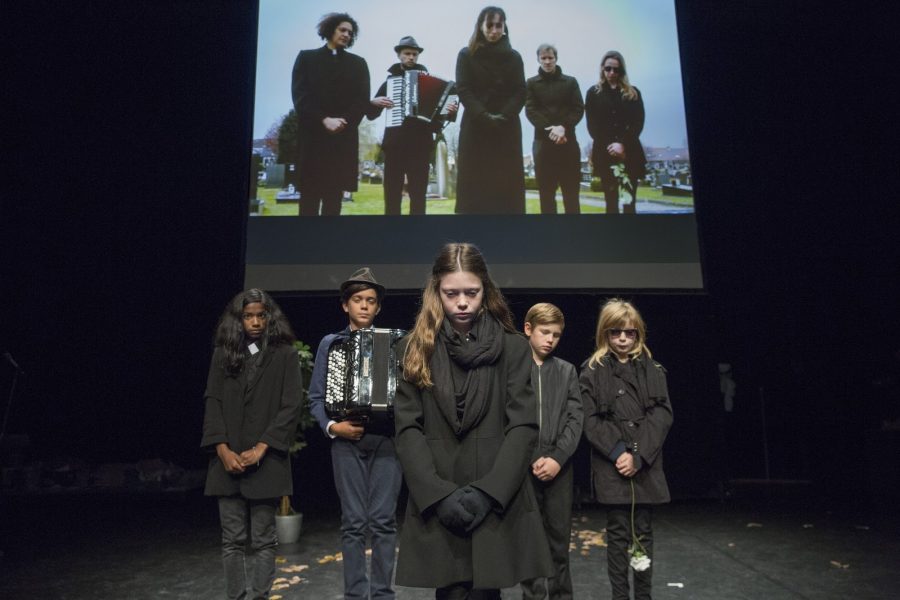At the junction of childhood, trauma, post-colonialism, political murder and theater is Milo Rau’s “Five Easy Pieces.” The title is projected onto a cloud-filled screen at the play’s opening as child actress Eva Luna Van Hijfte sings John Lennon’s “Imagine”; it’s an ironic gesture towards a children’s piano lesson book. With each easy piece, the pianist learns essential skills for mastery of the instrument. In the play, divided into five pieces, the players are guided through various lessons for mastery of worldly understanding.
But “Five Easy Pieces,” which premiered in May 2016 in Brussels and ran last weekend at Skirball, is no moonlight sonata. The audience is forced to bear witness to an account of the Belgian serial child-killer Marc Dutroux enacted by children between 11 and 15 years old — though they were younger when the play debuted.
The performances of the children as the victims and their loved ones are impressively effective and do not shy away from the difficult subject matter, even as their faces are filmed up close and projected onto the set’s large screen. In one piece, Fons Dumont plays a victim’s father dealing with the news of his daughter’s rape and murder; his performance manages, astoundingly, to convey his concurrent self-blame and political angst. In another, Blanche Ghyssaert takes on the role of one of the victims, describing being raped and incarcerated by the killer. “He doesn’t care whether it hurts or if I cry,” she says.
Due in part to the young actors’ precocious, devoted performances, the entire audience becomes palpably awash with discomfort — and this was certainly Swiss director Rau’s intention. In 2007, he founded his production company, The International Institute of Political Murder, to put weighty conflicts from around the globe onto the stage. Ranging from trials fighting for artistic freedom to colonial genocides in Africa, all its productions deal in some way with political brutalities. His works are not produced solely for shock value — they imitate the realities faced by people daily — and the discomfort of seeing children act out the Marc Dutroux affair is a reflection of the tremors felt across Belgium following the actual crimes.
“Five Easy Pieces” incorporates individual scenes from the crimes to dissect how national attitude shaped Belgian identity, and to examine human development and empathy. Interspersed with reenactments from the Dutroux affair are segments of casual dialogue between the child actors and a theater director, the only adult in the show, played by Hendrik Van Doorn. These conversations bring out the children’s personalities while also discussing the nature of theater, commenting on the way in which people develop an understanding of devastation.
“What are you scared of?” Van Doorn asks one of the girls, Lucia Redondo. Redondo replies, “I’m afraid of dying. I don’t know why. And if I imagine what it would be like if my parents were dead — no, I can’t imagine it.”
How we process tragedy, and how we confront the fragility of what we love, defines our growth and identity. This is central to how “Five Easy Pieces” unfolds. It is the ultimate lesson learned by the children, and by the audience watching as the children lose their starry-eyed vision of the world to a much gloomier reality. During rehearsals, two advisers and a child psychologist were present, as well as the children’s parents, to ensure the well-being of the young actors.
The play’s greatest setback is its convoluted focus. Is it a play about the nature of theater? Is it about Belgian national identity? Is it about the aftermath of a harrowing tragedy? Is it psychoanalysis of childhood and development? It proposes to be about all of these at once, and in doing so, a coherent focus is lost among a somewhat cluttered sequence of well-executed skits.
This is not to negate the significance of the themes covered. “Five Easy Pieces” is nonetheless a compelling, confrontational exploration of trauma — both direct and indirect — with child actors who turn all preconceptions of children on their head.
‘‘Five Easy Pieces” ran at the Skirball Center for the Performing Arts from March 7 to 9.
A version of this article appears in the Monday, March 11, 2019, print edition. Email René Bennett at [email protected].























































































































































